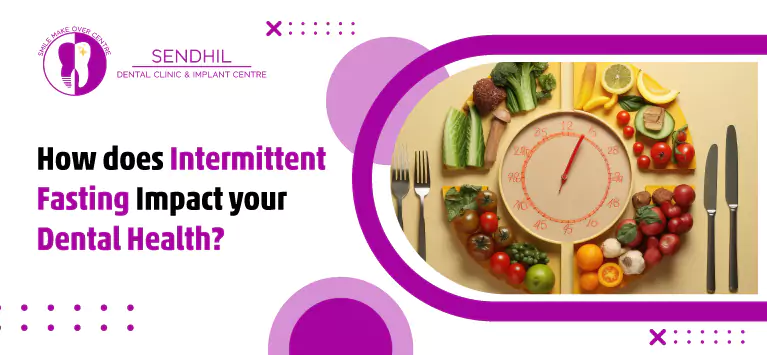
How does Intermittent Fasting Impact your Dental Health?
Are you wondering how intermittent fasting can positively impact your dental health? If so, then this blog post is the right place for you. Intermittent fasting is a dietary approach characterized by alternating periods of eating and fasting. Nowadays, it has gained popularity for its various health benefits. While most discussions focus on weight loss and metabolic improvements, its effects on oral health are equally noteworthy. In this blog, we’ll delve into the benefits of intermittent fasting, particularly its influence on dental health. We will uncover how fasting and oral health are related, from fresher breath to stronger teeth. We will also cover how intermittent fasting can contribute to a healthier smile.
Benefits of Intermittent Fasting
Intermittent fasting offers a plethora of benefits beyond weight management. Here’s a closer look at the health benefits of fasting:
Weight Loss
Intermittent fasting aids in regulating insulin levels, thereby promoting fat-burning and facilitating weight loss. During fasting, the body transitions from relying on glucose as its primary energy source to utilizing stored fat for fuel. This not only assists in weight loss but also enhances metabolic health.
Improved Heart Health
Fasting can lower blood pressure and cholesterol levels and reduce the risk of heart disease. By promoting weight loss and reducing inflammation, intermittent fasting supports cardiovascular health. It may result in lowering the risk factors associated with heart disease.
Enhanced Brain Function
Fasting stimulates the production of brain-derived neurotrophic factor (BDNF). It also supports cognitive function and reduces the risk of neurodegenerative diseases. Additionally, fasting has been linked to improved focus, clarity, and memory, enhancing overall brain health.
Regulated Blood Sugar
Intermittent fasting enhances insulin sensitivity, which aids in regulating blood sugar levels and mitigating the risk of type 2 diabetes. Fasting may improve glucose control and insulin response by giving the pancreas a break from constant insulin production.
Cellular Repair
During fasting, cells initiate autophagy, eliminating damaged components and fostering cellular repair. This cellular cleansing mechanism may help protect against various diseases and slow aging.
Intermittent fasting revolves not only around what you eat but also around when you eat. You can reap these remarkable health benefits by incorporating fasting periods into your routine.
Benefits of Intermittent Fasting for Women
Many women wonder if intermittent fasting is suitable for them. Here’s why it can be beneficial:
Reduced Risk of Gum Disease
Intermittent fasting may decrease inflammation, lowering the risk of gum disease and promoting healthier gums. By reducing oxidative stress and inflammatory markers, fasting can help prevent periodontal diseases such as gingivitis and periodontitis.
Enhanced Saliva Production
Fasting stimulates saliva production. It plays a crucial role in rinsing away food particles and bacteria, thus reducing the risk of cavities. Saliva also contains minerals like calcium and phosphate, which help remineralize tooth enamel and prevent decay.
Improved Immune Function
Intermittent fasting can boost immune function by reducing inflammation and supporting the body’s natural defense mechanisms. Maintaining a robust immune system prevents oral infections and ensures optimal oral health.
Balanced Oral Microbiome
Fasting may promote a healthier balance of oral bacteria. It reduces the risk of harmful bacteria overgrowth and dental infections. By limiting the availability of sugars and carbohydrates, fasting creates a less favorable environment for cavity-causing bacteria.
Reduced Risk of Dry Mouth
Intermittent fasting can help alleviate dry mouth symptoms by stimulating saliva production and promoting hydration. Dry mouth heightens the risk of both tooth decay and gum disease. This makes adequate saliva flow crucial for oral health.
By integrating intermittent fasting into their lifestyle, women can enjoy these oral health benefits alongside other physiological improvements.
Fresh Breath While Fasting
Maintaining fresh breath is essential, especially during fasting periods. Here’s the relation between fasting and teeth health:
Decreased Acid Production
Fasting reduces the frequency of acid attacks on teeth, preserving enamel and preventing decay. When we consume sugary or acidic foods, bacteria in the mouth produce acids that can erode tooth enamel. By limiting the time window for consuming such foods, intermittent fasting helps protect the teeth from acid damage.
Promotion of Oral Hygiene
Fasting encourages mindful eating habits, leading to better oral hygiene practices such as brushing and flossing. During fasting periods, individuals are more conscious of their food choices. And they tend to avoid sugary snacks and beverages, reducing the risk of plaque buildup and cavities.
Improved Tooth Sensitivity
Some individuals experience reduced tooth sensitivity during fasting periods. Why? The absence of constant exposure to sugars and acids can help desensitize the teeth over time. This can lead to a more comfortable eating experience and better oral health.
Enhanced Dental Treatment Outcomes
Fasting before dental procedures may improve treatment outcomes by reducing inflammation and promoting faster healing. Additionally, fasting can help minimize post-operative discomfort and enhance the effectiveness of certain dental treatments.
Long-Term Dental Health
Incorporating intermittent fasting into your lifestyle can contribute to long-term dental health. Besides, it reduces the risk of oral diseases and preserves the integrity of teeth and gums. Maintain a healthy diet and practice good oral hygiene habits to enjoy a lifetime of strong, beautiful teeth.
With intermittent fasting, you can enjoy fresher breath and stronger teeth, contributing to oral health and hygiene.
Intermittent Fasting and Dental Health: Does Fasting Affect Your Teeth?
The impact of intermittent fasting on dental health is significant. Here’s a comprehensive look at how fasting can influence your teeth:
Enamel Preservation
Fasting reduces the frequency of acid exposure to teeth, preserving enamel and preventing erosion. Acidic foods and beverages can weaken tooth enamel over time, making them more susceptible to decay and damage. By limiting the consumption of these substances during fasting periods, intermittent fasting helps maintain the integrity of tooth enamel.
Cavity Prevention
By limiting the window of time for consuming sugary and acidic foods, intermittent fasting can lower the risk of cavities. Additionally, fasting promotes saliva production, which helps neutralize acids in the mouth and remineralize tooth enamel. This further reduces the risk of cavities and decay.
Gum Health
Intermittent fasting may decrease inflammation in the gums. Moreover, it reduces the risk of periodontal diseases such as gingivitis and periodontitis. It promotes a healthy balance of oral bacteria and reduces plaque buildup. With all this, fasting supports gum health and prevents gum disease.
Prevention of Dental Erosion
Fasting can help prevent dental erosion by reducing the frequency of acid exposure to teeth. Acidic foods and drinks and gastric reflux can erode tooth enamel over time, leading to sensitivity and decay. Intermittent fasting minimizes the opportunity for acid attacks, preserving the structural integrity of the teeth.
Support for Oral Healing
Fasting may support faster healing following oral surgeries or dental procedures by reducing inflammation and promoting tissue regeneration. By optimizing the body’s natural healing processes, intermittent fasting can enhance recovery and minimize complications associated with dental treatments.
Intermittent fasting offers various health benefits and positively impacts dental health. Incorporate fasting periods into your routine and practice good oral hygiene. Doing these allows you to enjoy fresher breath, stronger teeth, and improved oral health.
Finishing Up
Incorporating intermittent fasting into your lifestyle can significantly improve your oral health. Doing these allows you to enjoy fresher breath, stronger teeth, and improved oral health. You can achieve a healthier smile and overall well-being by understanding intermittent fasting dental health and adopting mindful eating habits. So why try it and see the difference it makes for your dental health?



